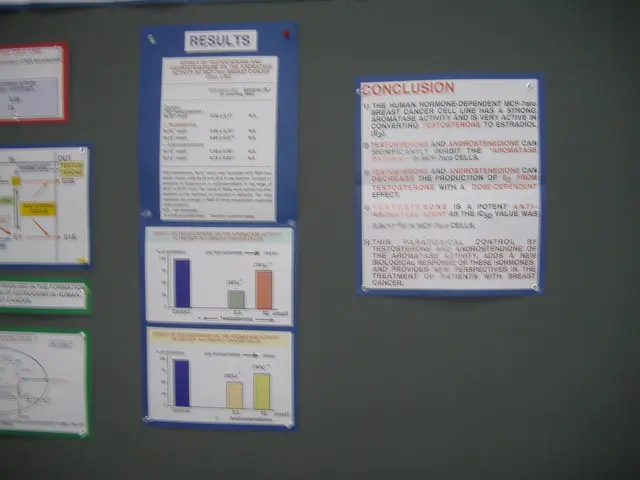Plunging consumer confidence in the U.S. reaches levels not seen since the Covid-19 pandemic, fueled by economic tension from a trade war resulting in heightened unease among citizens.
ECONOMIC WOES MARCHES FIFTH MONTH
America's economic confidence plunges to pandemic-era lows as the impact of tariffs deepens, according to a report by The Conference Board. The Consumer Confidence Index tumbled 7.9 points to 86 in April - the lowest since May 2020.
In the coming months, nearly one-third of consumers anticipate a hiring slowdown, approaching levels seen during the Great Recession in April 2009. This gloomy sentiment reflects escalating concerns over skyrocketing prices due to tariffs and the possibility of a recession.
Carl Weinberg, High Frequency Economics' chief economist, warns that if confidence dives and consumers retrench, economic growth will follow suit. The index measuring American short-term expectations of income, business conditions, and job market fell a steep 12.5 points to 54.4 - the lowest in more than a decade. This metric typically indicates a recession on the horizon.
The hard-hitting mood of consumers is poised to translate into reduced spending, hiring, and economic growth, though the exact consequences will unfold in the coming days and weeks. On Wednesday, the U.S. reports Q1 economic growth, and economists anticipate a sharp slowdown following a robust winter holiday shopping season.
Friday's Labor Department report will display hiring and unemployment trends. Although steady job gains are still projected, some forecasts predict a pronounced decrease in hiring.
This steep decline in consumer confidence likely reflects volatile stock and bond market swings earlier this month, with all age groups and most income brackets reporting lower confidence, particularly households earning over $125,000 and consumers aged 35 to 55. Despite recent market recovery, the S&P 500, Dow Jones, and Nasdaq remain in the red, suffering losses of 6%, 5%, and 10%, respectively, in 2025.
Tariffs have dominated consumer worries, as mentions of tariffs in written responses reached an all-time high in April. President Trump imposed a 10% tariff on most imports and a colossal 145% tariff on China-sourced goods, along with separate import taxes on steel, aluminum, and cars.
The increased probability of a recession has consumers rethinking their spending inclinations. Fewer planned home or car purchases, decreased spending on services, and reduced vacation travel populate consumer sentiments. In fact, only 16.4% of consumers anticipate overseas travel in the next six months, down from 24.1% in December. The proportion of Americans planning to dine out plummeted by a near-record amount in April according to The Conference Board.
TOP BUSINESS STORIES
- Alaska Air's Portland Strategy: A Sea-Tac Relief Valve
- UPS Job Cuts: 20,000 Layoffs in 2025
- Seattle Awaits as Tariff-Induced Shipping Delays Mount
- Amazon's Tariff Label Controversy: Fact or Fiction?
- Cooperation Proposal: China Responds to Boeing Dispute
Tariff Falls Out: Impact on 2025 American Consumer Confidence & Economy
The Trump administration's 2025 tariff policies have sent waves across the American economy and consumer sentiment. Key observations include the following aspects:
Trends:1. Slowing Economic Growth: Q1 GDP contracted by 0.3%, largely due to businesses stockpiling goods before the new tariffs[2].2. Heightened Tariff Rates: Effective U.S. tariff rates surged to 22½% after 2025 tariffs were implemented - the highest since 1909[4].
Concerns:1. Recession Risk: Economists forecast an elevated risk of a recession in 2025 due to potential tariff disruptions[2].2. Consumers' Buying Power: The average household faced a loss of $3,800 short-term due to increased prices[4].
Effects on Spending, Hiring, & Growth:1. Tightened Wallets and Spending: The price increase hits consumer pockets, potentially decreasing disposable income and worsening spending habits[4].2. Employment Shift: Although direct hiring impacts are not common, the economic slowdown could lead to reduced job opportunities caused by businesses adjusting to decreased demand and increased costs.3. Growth and GDP: Real GDP growth is expected to decline by 0.5 to 0.9 percentage points due to the tariffs, representing a continuing negative impact on the economy's size[4].4. Long-term Effects: The Penn Wharton Budget Model foresees long-run GDP reduction by about 6% and wage reduction by 5%, with substantial lifetime losses for middle-income households[1].
In summary, tariffs in 2025 have imposed economic stagnation, increased consumer prices, and fueled concerns over a recession - impacts stretching from immediate spending habits to long-term economic growth.
- The government's implementation of tariffs in 2025 raised concerns about a potential recession, with economists forecasting an elevated risk due to potential disruptions.
- The increased tariff rates led to an average household losing approximately $3,800 short-term due to increased prices.
- As a result, consumers' buying power decreased, potentially worsening spending habits and tightening wallets.
- The economic slowdown could lead to reduced job opportunities, with businesses adjusting to decreased demand and increased costs bringing about employment shifts.
- Real GDP growth is expected to decline by 0.5 to 0.9 percentage points due to the tariffs, representing a continuing negative impact on the economy's size.
- The long-run GDP reduction is expected to be about 6%, and wage reduction by 5%, according to the Penn Wharton Budget Model, with substantial lifetime losses for middle-income households.
- The economic woes marched on into the fifth month, as the tariffs reportedly imposed economic stagnation, increased consumer prices, and fueled concerns over a recession - impacts stretching from immediate spending habits to long-term economic growth.
Top Business Stories:- Alaska Air's Portland Strategy: A Sea-Tac Relief Valve- UPS Job Cuts: 20,000 Layoffs in 2025- Seattle Awaits as Tariff-Induced Shipping Delays Mount- Amazon's Tariff Label Controversy: Fact or Fiction?- Cooperation Proposal: China Responds to Boeing Dispute







